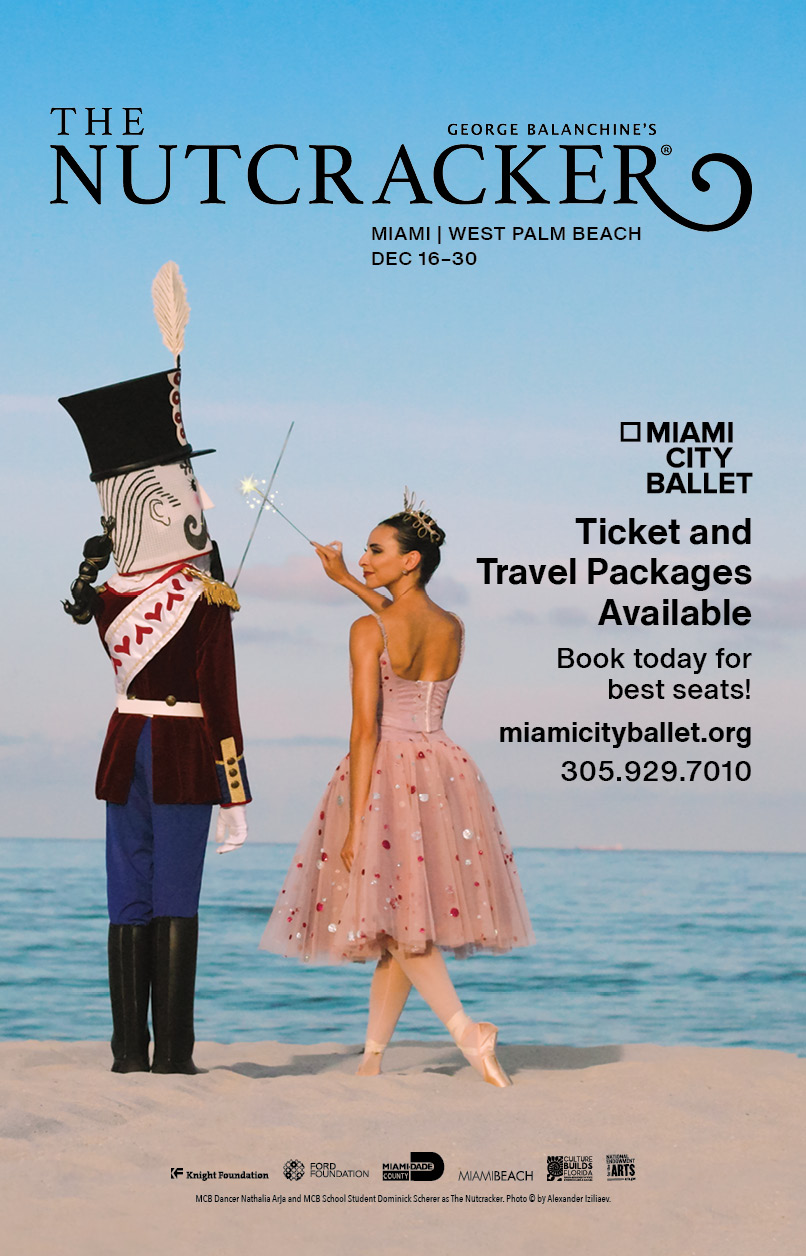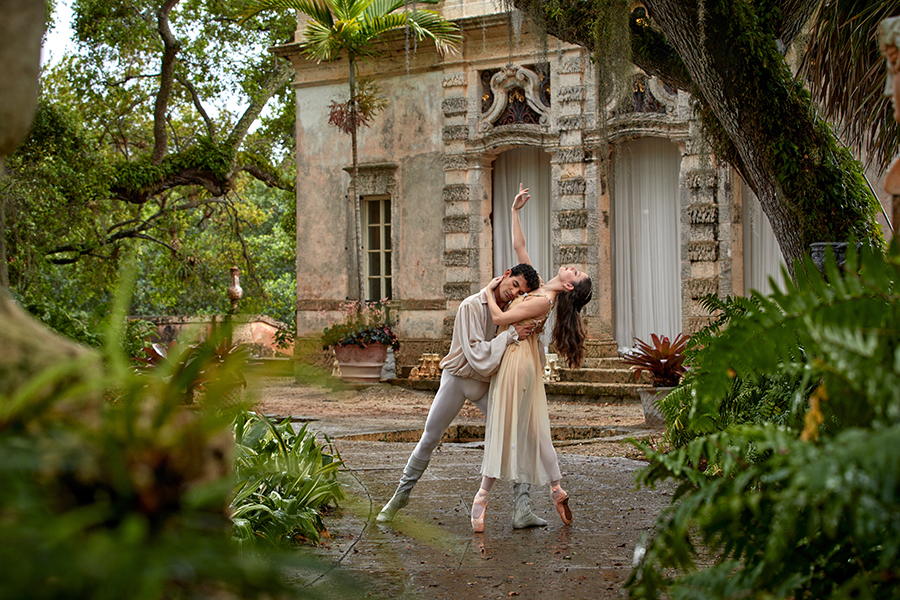
We are so glad you're here. I am thrilled to present a season that celebrates ballet's past, present, and future. As I dive into my 11th season as your artistic director, I am in awe of this extraordinary company and all its infinite possibilities.
This season we share Shakespeare's most famous love story as told through John Cranko's masterpiece Romeo and Juliet and again through Jerome Robbins' ever-popular West Side Story Suite.
We bring you two examples of Modern dance pioneers, Martha Graham and José Limón, while ushering in diverse, boundary-breaking choreographic voices such as Pontus Lidberg and Amy Hall Garner.
Then, we connect visionary young artists like choreographer Durante Verzola and designer Esteban Cortázar to the past through the music of Ernesto Lecuona.
And finally, we reimagine George Balanchine's Square Dance, giving it a decidedly Miami twist.
Thank you for being with us and sharing in these stories that we hope will emotionally transport, inspire, and most of all, entertain you.
Love,


A Ballet in Three Acts after William Shakespeare
Credits
Choreography by John Cranko
Music by Sergei Prokofiev*
Staged by Filip Barankiewicz
Copyright: Dieter Gräefe
Scenic and Costume Design** by Susan Benson
Lighting Design by Robert Thomson
Sword Fighting Coach: Christian Sordelet
Romeo and Juliet, Ballet, op. 64 by Sergei Prokofiev presented under license from G. Schirmer Inc. and Associated Music Publishers, copyright owners.
**Costumes and Scenery courtesy of The National Ballet of Canada
Program Note
The triumph of John Cranko’s world-famous version of the greatest of all love stories is the way the choreographer has found a perfect marriage between the heart-rending intimacy of the private tragedy and the boisterous – and dangerous – life of a small Italian Renaissance city.
Prokofiev’s thrilling score both soars ecstatically in the love passages – the balcony, the bedroom scene, the tomb scene – and brings to life the down-to-earth atmosphere of Verona: the swirling gypsies, the ribald country folk in town for the carnival, the tarantella and most of all, the brilliant, and fatal, swordplay that sweeps up the followers of the Capulets and the Montagues. His music for the young lovers, for the ball scene, for the antics of Mercutio and the haughty passion of Tybalt, provide the richest of opportunities for a superbly talented choreographer.
Cranko created this Romeo and Juliet in 1962 for the Stuttgart Ballet, and it immediately established itself as a classic, more human in scale than both the original Kirov/Bolshoi version by Leonid Lavrovsky and the Kenneth MacMillan interpretation to come. Youthdriven, rapturously sensual, it is considered by many critics to be the finest – the most moving – of all dance versions of Shakespeare’s immortal play.
Miami City Ballet premiere: March 25, 2011, Adrienne Arsht Center for the Performing Arts, Miami, FL.
“In fair Verona, where we lay our scene…”
ACT I
SCENE 1: THE MARKETPLACE
As day breaks, Romeo, son of Montague, is found declaring his love for the fair Rosalind. With the sunrise, the marketplace fills with townspeople, among whom are members of two rival families, the Capulets and the Montagues. Tempers flare and a quarrel develops. The Duke of Verona appears and warns the two factions that death will be the ultimate punishment if the feud does not stop. Romeo and his friends Benvolio and Mercutio make reluctant peace with Tybalt, a kinsman of the Capulets.
“if ever you disturb our streets again, your lives shall pay the forfeit of the peace.”
SCENE 2: JULIET’S GARDEN IN THE CAPULET’S HOUSE
Juliet receives her first dress from her mother, Lady Capulet, and learns that she is to meet the noble Paris, to whom she will be betrothed on the following day. Now she must bid farewell to her childhood.
SCENE 3: OUTSIDE THE CAPULET’S HOUSE
Guests appear for the Capulet’s ball, among them Rosalind. Romeo and his friends, masked, follow her to the ball.
“You are a lover; borrow Cupid’s wings, And soar with them above a common bound.”
SCENE 4: THE BALLROOM
Juliet dances with Paris. Suddenly, she and Romeo behold each other – it is love at first sight. Tybalt, suspecting Romeo’s identity, tries to start an argument but is prevented by Lord Capulet, who abides by the laws of hospitality.
SCENE 5: JULIET’S BALCONY
“My bounty is as boundless as the sea, My love as deep; the more I give to thee, The more I have, for both are infinite.”
On the balcony outside her bedroom, Juliet dreams of Romeo. He appears below in the garden.
They declare their eternal love.
“But, soft, what light through yonder window breaks? It is the east, and Juliet is the sun.”
Act II
SCENE 1: THE MARKETPLACE
A carnival is in progress in the main square. Romeo, indifferent to the gaiety around him, is discovered by Juliet’s nurse, who brings him a letter from her. In the letter, Juliet asks Romeo to meet her at the chapel of Friar Laurence.
SCENE 2: FRIAR LAURENCE’S CELL IN THE FOREST
In his cell, Friar Laurence joins the young lovers in marriage.
SCENE 3: THE MARKETPLACE
At the height of the carnival, Romeo returns to the square. Tybalt accosts him, but Romeo declines to fight. Mercutio, angered, engages in a duel with Tybalt, and dies at his hands. Romeo, distraught, turns on Tybalt and kills him.
Act III
SCENE 1: THE BEDROOM
In Juliet’s bedroom, the lovers are awakened by the sunrise. Romeo, under sentence of exile, must leave Juliet and Verona. Lord and Lady Capulet enter with Paris, but Juliet rejects him.
SCENE 2: FRIAR LAURENCE’S CELL IN THE FOREST
Juliet, appealing to Friar Laurence for help, receives a potion from him that will place her in a death-like sleep. He explains that Romeo will find her in the family tomb and both can escape together.
SCENE 3: THE BEDROOM
Juliet agrees to her marriage with Paris. After he leaves with her parents, she takes the sleeping draught. Her family and friends believe she is dead when they discover her.
SCENE 4: THE CAPULET FAMILY CRYPT
Romeo, who never received Friar Laurence’s message revealing the plan, believes Juliet to be dead and rushes to the tomb. There he finds the mourning Paris and kills him. Embracing Juliet for the last time, he plunges his dagger into his heart. Juliet awakens to find Romeo dead. Grief-stricken, she kills herself.
“For never was a story of more woe
Than this of Juliet and her Romeo.”
Artistic Director Lourdes Lopez
Chair, Board of Trustees Jeff Davis
Founder Toby Lerner Ansin
Founding Artistic Director Edward Villella
Production and Lighting Director John D. Hall
Principal Conductor Gary Sheldon
Principal Rehearsal Director Roma Sosenko
Rehearsal Directors Joan Latham, Arnold Quintane
Company Pianist Francisco Rennó
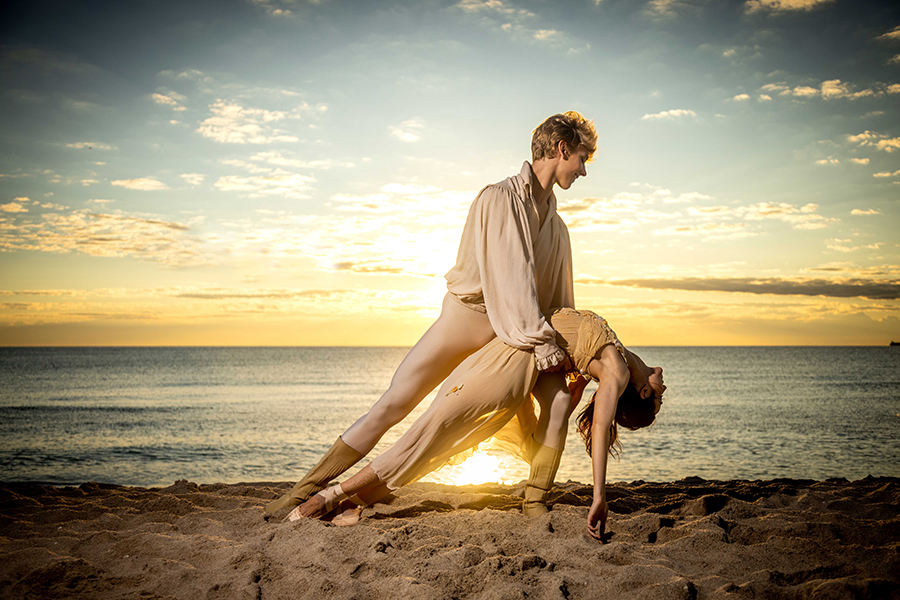
There are a handful of coveted roles where dancers can spend their entire careers dreaming of being called to rehearsal – the moment when a small selection of dancers is chosen to learn various ballet roles – usually by the choreographer or a repetiteur (a person with extensive knowledge of a particular ballet). When that role is Juliet set to John Cranko’s stunning choreography and Sergei Prokofiev’s timeless score, that desire and anticipation grow exponentially.
We chatted with principal dancer Katia Carranza and Isadora Valero, who joins MCB’s corps de ballet this season, to discuss their approach to translating Shakespeare’s immortal words into the beautiful dance you see on stage.
(Katia learned Cranko’s Juliet as part of MCB’s 2010/11 season and has performed Jorge Amarante’s Romeo and Juliet in Mexico. This is Isadora’s first time learning the role.)
Why do you think this ballet is so famous?
Isadora: John Cranko made the first iconic Romeo and Juliet. Let’s say he has set the bar. It’s a beautiful play, a great combination of drama, dance, and theater. So many of us can identify with the passion and intensity of young love. I can recall what it feels like to be a teenager. All the hormones, the transformation into adulthood, and all the emotions!
Katia: Yes, and the music is incredible!
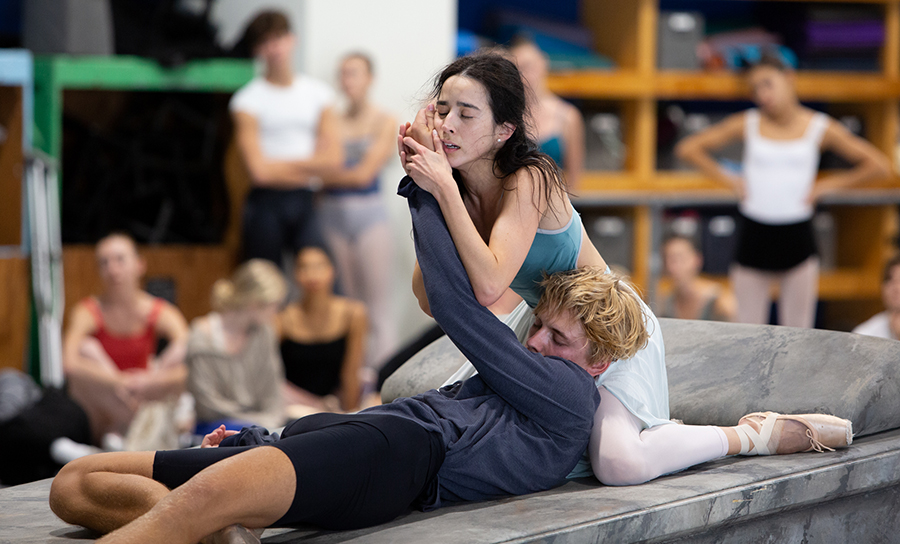
What did it feel like to be called to rehearsal?
Katia: I honestly feel so excited to be able to perform this role again. It’s a great opportunity I have been given.
Isadora: It’s funny. I was in the stairway, and a colleague congratulated me. I was shocked! This has been my dream role for a long, long time, and I wished for it from the bottom of my heart. But I was not expecting it.
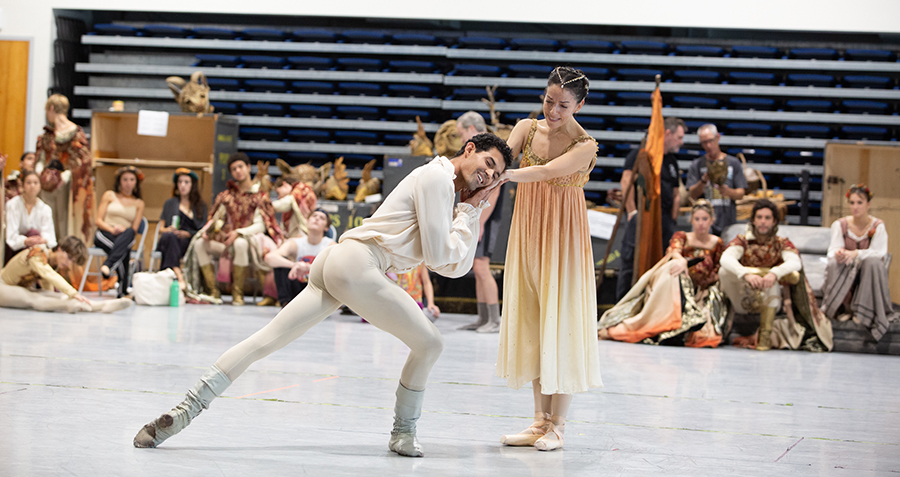
What is the biggest challenge you have faced learning this role?
Katia: Studying the interpretation of the character; to be able to tell the story to the audience and reach their feelings.
Isadora: It’s like the body is doing the whole dialogue… telling this story and becoming Juliet.
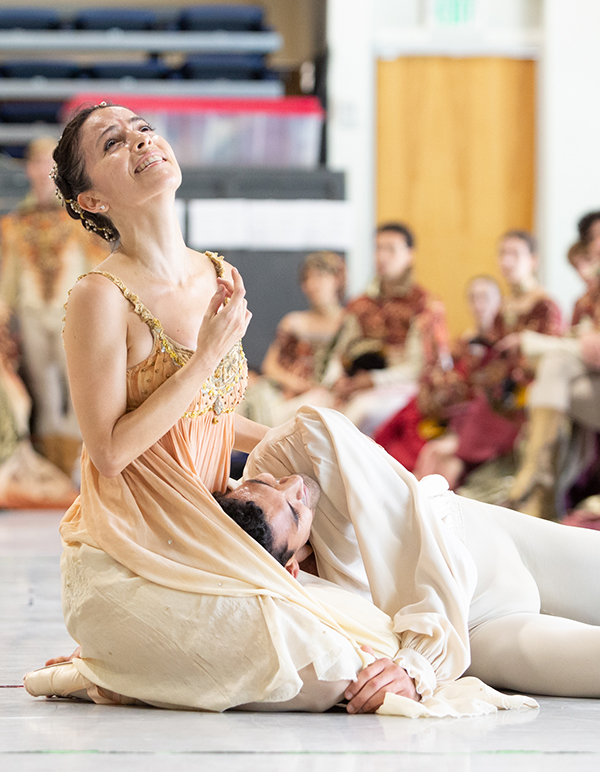
Many consider the Balcony Pas de Deux one of the best created. What makes this pas de deux so unique?
Katia: Cranko tells you precisely what he wants you to share with the audience, making every lift, movement, and port de bras emotionally powerful.
Isadora: And he created Juliet on Marcia Haydée, who was so special and so fearless. This ballet would not be the same without her. These aren’t classical ballet lifts and partnering, that you already know. It’s very difficult partnering and you really need to trust your partner.
Have you ever suffered a broken heart:
Katia: I think everyone suffers a broken heart at some point. But with time, you understand and grow from these experiences.
Isadora: Actually, I have not. I guess I’m lucky. Or maybe it’s me who breaks hearts…? Oh no!
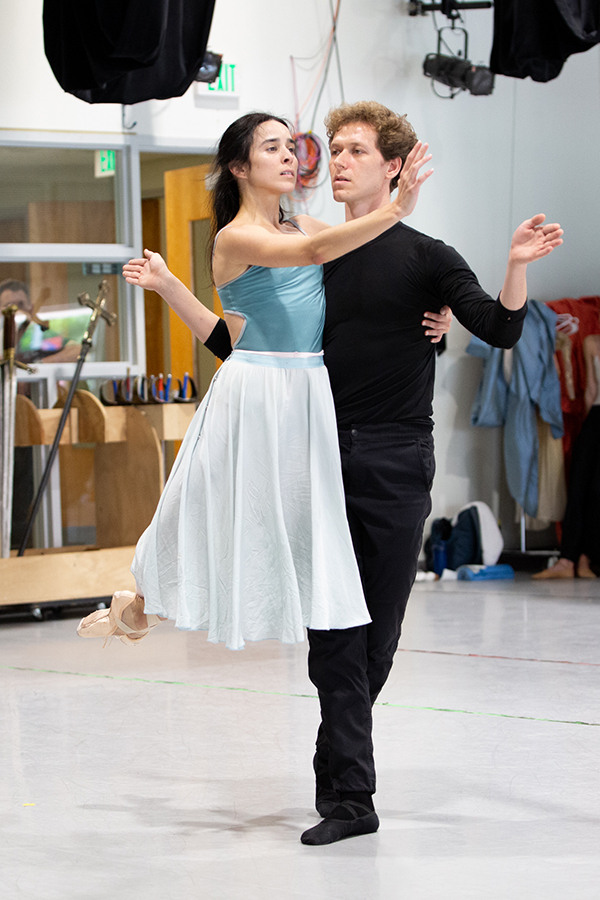
And finally, what do you think is the most romantic place in Miami?
Katia: I think the view from Bayfront can be the most romantic place in the right company.
Isadora: Anything that connects me to nature feels very romantic. After filming a video for Romeo and Juliet at dawn one morning, I would say that sunrise on Miami Beach is the most romantic thing I’ve ever seen.
